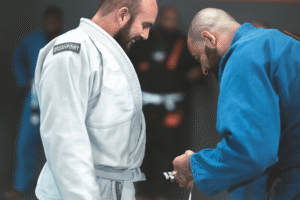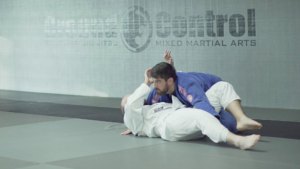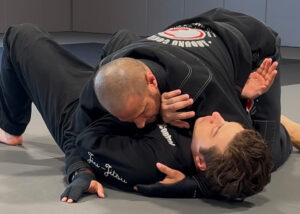
From White Belt to Black Belt: How to Stay in the Game Long-Term
Let’s face it, starting Brazilian Jiu-Jitsu is exciting. Every class feels like unlocking a new superpower. However, as time passes, that initial rush begins to
In boxing, defense is just as critical as an offense. While it’s thrilling to master a powerful punch or swift combination, the ability to defend yourself effectively is what sets great boxers apart from the rest. Solid defense allows you to avoid getting hit while creating opportunities for counterattacks. But what many people overlook is how mastering defensive techniques can actually improve your strikes.
Let’s explore some fundamental defensive techniques in boxing that, when perfected, will sharpen your overall boxing game and lead to more effective, accurate strikes.
Head movement is one of the most basic yet essential defensive skills in boxing. It allows you to evade punches while staying within striking distance, which means you can slip an opponent’s jab and be in the perfect position to deliver a counterpunch.
How to Improve:
Slip: Practice slipping punches by moving your head slightly to the left or right just as your opponent’s punch is coming. This will help you avoid the strike while staying close enough to counter quickly.
Roll: This involves bending your knees and rotating your upper body to roll under punches, particularly hooks. It’s a fantastic move for maintaining balance and keeping yourself in range for a countershot.
By mastering head movement, you can stay safe while setting yourself up for more accurate counterattacks. The better your head movement, the more opportunities you create to land crisp, effective punches without taking unnecessary damage.
Your guard is your first line of defense. There are different types of guards (high guard, Philly shell, etc.), but the purpose is the same: protect your head and body from your opponent’s strikes. A solid guard blocks punches and provides a strong base to throw effective counters.
How to Improve:
High Guard: Always keep your hands up, elbows tucked in close to your body. This will allow you to absorb punches on your arms and gloves while being ready to fire back with quick counters.
Blocking: Focus on making small, efficient movements with your arms to block incoming punches. Instead of large, exaggerated movements that can leave you open, keep your defense compact and quick.
A strong guard builds a foundation for better strikes. It keeps you composed under pressure and allows you to recover from defensive positions to deliver powerful punches.
Footwork is not just about moving forward and backwards; it’s about controlling the distance and staying in the correct position to strike while making it hard for your opponent to hit you. Good footwork allows you to evade punches, change angles, and create openings for clean shots.
How to Improve:
Pivoting: Practice pivoting on your lead foot to change angles. This is a great way to avoid punches and place yourself in a better position to attack.
Lateral Movement: Moving side to side keeps your opponent guessing and forces them to reset their attacks. Always keep your feet shoulder-width apart to maintain balance while moving.
Great footwork helps you set the pace of the fight. You can dictate when and where to strike when you control the ring, leading to more efficient and powerful punches.
Parrying is a highly effective defensive maneuver that allows you to deflect an opponent’s punch and immediately create an opportunity for a counterattack. It involves using your hand to push away an incoming punch lightly, redirecting its energy without expending much of your own.
How to Improve:
Timing: Parrying is all about timing. Practice lightly tapping away jabs and straights as they come toward you. The goal is to be quick and precise, not forceful.
Counterattacks: After parrying a punch, immediately follow up with your own strike. The quicker you transition from defense to offense, the more successful your parry will be.
Parrying teaches you to stay calm under fire and look for offensive opportunities while defending yourself. It becomes one of the most fluid ways to strike back effectively when perfected.
Feints are often considered an offensive tool and a critical part of the defense. You can get your opponent to react prematurely by pretending to throw a punch, leaving them open for a real strike. Feints work as both a mental and physical defense mechanism, as they can disrupt your opponent’s rhythm and cause hesitation.
How to Improve:
Subtlety: Feints should be subtle, like a quick shoulder or hip movement that makes your opponent believe a punch is coming. Overly exaggerated feints will be easily recognized and lose their effectiveness.
Combination Feints: Combine your feints with actual punches. Throw a feint jab, then follow up with a real hook. This will confuse your opponent and open up more opportunities to land clean shots.
When you master the art of feinting, you control the pace of the fight and make your opponent more tentative in their attacks, allowing you to capitalize with well-placed strikes.
It’s easy to think of defense and offense as separate elements of boxing, but they are deeply intertwined. A strong defense protects you and creates opportunities to land better, more effective strikes. By improving your defensive skills, you’ll find that your ability to deliver powerful and precise punches will grow significantly.
At Ground Control Columbia, we believe in a well-rounded boxing approach. Our classes are designed to help you master defensive and offensive techniques in a supportive, high-energy environment. Whether you’re new to boxing or looking to refine your skills, our expert trainers will guide you every step of the way. We offer a variety of classes, including co-ed, beginner, and advanced sessions, so there’s something for everyone.
Ready to level up your boxing game? Join Ground Control Columbia’s boxing program today and become the best version of yourself inside and outside the ring. Let’s start your journey toward mastery—sign up for your first class now!

Let’s face it, starting Brazilian Jiu-Jitsu is exciting. Every class feels like unlocking a new superpower. However, as time passes, that initial rush begins to

You’ve put in the hours on the mats—drilling, rolling, building a solid ground game—and now you’re thinking about stepping into something more intense: MMA. It’s

At Ground Control Columbia, our advanced athletes know the real battles don’t always happen in submissions—they happen when you’re fighting to keep your guard alive.
© All Rights Reserved. Ground Control Columbia